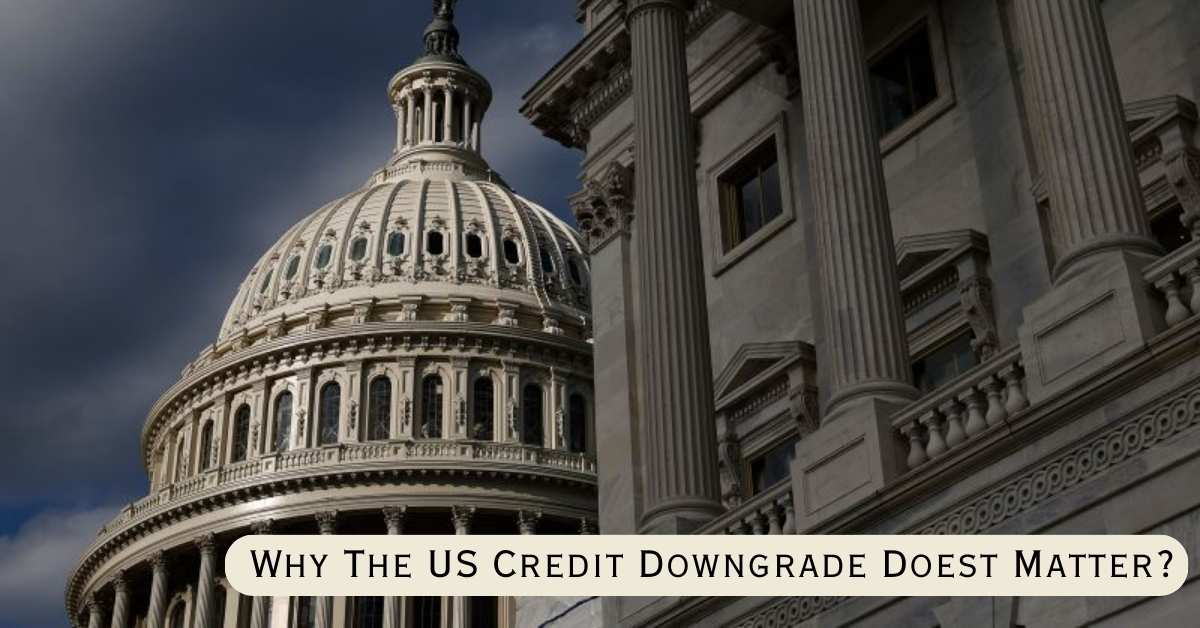Does it make a sound if our credit rating goes down and no one sells their bonds? Fitch Ratings took away the United States’ top-tier national credit rating on Tuesday, dropping the country’s debt from AAA to AA+. As a result of this “flight to safety,” the price of Treasury bonds went up and their yields went down on the bond market overnight.
When things don’t go as planned, investors usually turn to the safest financial investments in the world: the sovereign debt of the United States. Even if the surprising thing is the news that the debt’s rating will go down, this is still true. Why? First, no one buys Treasuries based on how well they are rated. In some ways, ranking the credit of the United States is a silly thing to do.
When it comes to the creditworthiness of the U.S. government, investors are not required by law or contract to pay attention to what a rating agency says. This is different from bonds released by corporations or cities. No one makes real investments based on rating agencies’ concerns about Treasuries’ safety.
The rating of the U.S. debt raises some interesting questions. If the U.S. is not AAA, can government-sponsored companies that back mortgage securities be AAA? Does it make sense to say that any U.S. company is as safe or even safer than the U.S. government? What about businesses and banks that keep extra cash in Treasuries? Should they now be seen as more dangerous? Does China deserve a downgrade because so many debt instruments of the now-downgraded U.S. government are held by its financial institutions?
No honest answer can be given to these questions. They are interesting theoretically, but they won’t have much of an effect on the stock market, business results, or national budgets. The downgrade is probably best seen as a marketing move by Fitch Ratings, a way to show investors and people who sell debt that Fitch takes its job of reviewing credit risk very seriously.
A Downgrade That Downgrades the Downgrader
Some of the responses from the media with power have been funny.
You don’t have to believe what we say. Here’s what former U.S. Treasury Secretary Larry Summers had to say about Twitter, which used to be called Twitter:
The United States faces serious long-run fiscal challenges. But the decision of a credit rating agency today, as the economy looks stronger than expected, to downgrade the United States is bizarre and inept.
— Lawrence H. Summers (@LHSummers) August 1, 2023
This is what Jason Furman of Harvard had to say:
This is completely absurd. And is more likely to show that Fitch is irrelevant to the views of investors in U.S. sovereign debt than it is to show investors anything about the United States. https://t.co/fvYpg7N0hR
— Jason Furman (@jasonfurman) August 1, 2023
All This Has Happened Before, All This Will Happen Again
The market has been so cool about the downgrade because it has happened before and we know how it will end. When S&P downgraded the U.S. debt by one notch in 2011, there was a lot of uncertainty about what this might mean under financial rules and how investors might respond. Even though the stock market was already on edge because of problems with European debt and a weakening U.S. economy, it went down even more.
You can also take a look at other latest news we have covered on our site:
- How Did Ryan Siew Die? Know The Untold Reason Behind His Death
- MGK Explains Why He Punched A Fan At Roch Werchter Festival
The S&P fell by 6.5%, and it didn’t get back to where it was before for another six months. When the U.S. debt was downgraded at that time, interest rates on U.S. debt went down. This made it cheaper to borrow money. So the rating made more people want to buy U.S. Treasuries.
This time, the response is a lot less loud. By Wednesday morning, investors understood they didn’t need to run to safety, so the initial rush to buy long-term Treasuries the night before had died down a bit. The stock market was going down, but not by a lot. Wednesday at noon, the S&P 500 was only down by 1.3%. The Nasdaq was down even more, but that seems to be because people are worried that sales of microchips might not be as good as AI fans had hoped.
To know more latest news you can join us on our Twitter account.
